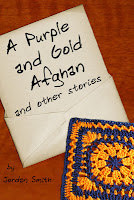Jordan, Welcome to
Homeschool Authors. Tell us a little bit about yourself?
I’m a homeschool graduate, a filmmaker, and a storyteller.
I’m passionate about telling great stories in any medium (books, movies, etc.)
and I love to help other people hone their own stories. Currently, I have two
books in print, Finding the Core of Your
Story and A Purple and Gold Afghan
and other stories. My other job is working customer support at a small
homeschool publisher, Simply Charlotte Mason. I’m also a musician (guitar,
hammered dulcimer, and djembe) and a big fan of pizza.
What was one of the
funniest things that happened during your homeschooling years?
Back when I was much younger, my family had many educational
computer games from the now-defunct company Edmark. They packaged their
software with a set of videos for parents, explaining what children were
supposed to learn from each activity. My sister and I decided that we should
watch the videos so we would know what we supposed to be learning and could
avoid it. It didn’t work very well.
I understand that you
are working on the second season of one of my favorite shows, Month of theNovel. Could you tell us some about that?
I could go on and on about Month of the Novel Season 2, but
I’ll just give you the highlights and an update of where we are now.
The second season is going to be roughly twice the length of
the original series and it involves a science fiction novel this time.
Everybody on the project has upped their work considerably and taken the show
to a new level. I really can’t wait for people to see it. Right now, though,
we’re in the middle of editing the episodes and getting them ready for
November.
What caused you to
start writing?
A lot of writers have a story about how they began to write
“books” at an early age, but my version is a little different. When I was in
school, I used to dread my writing assignments. At the same time, I was
blogging in my early teens, which I enjoy immensely. At this point, I have been
involved in writing for at least six different blogs. My blogging skills fed
into my enjoyment of writing, but most of what I did was nonfiction.
I also loved making short films. As I got better at
filmmaking, I began to write screenplays, which opened up the door to writing
fiction. Eventually, I began to write fiction in prose as a way to explore
thoughts and feelings. So I guess you could say that my creative writing is
very much an emotional outlet.
What caused you to
write Finding the Core of Your Story?
I am a member of a filmmaking forum. On the forum, there was
a thread about writing loglines, which are basically single-sentence pitches
for a story. As I participated in the thread, I started noticing patterns and
got pretty good at writing loglines. I was trying to share my findings with
other members to help us all improve, and eventually it got to the point where
my forum posts became blog posts, which in turn became a book.
What is it about?
As you’ve probably guessed from the previous answer, Finding the Core of Your Story is a book
that teaches storytellers how to create a single, compelling sentence that gets
across what a story is about. It’s a skill that every storyteller needs to know
for a variety of reasons. You need it when you’re telling people about your
book in person, and also when you’re writing the description for Amazon. But
you can also use that sentence to make sure your story is staying on track.
It’s an incredibly powerful tool.
Where can people get
it?
It’s available on Amazon in both Kindle and printed editions.
Who will enjoy it?
Any storyteller. I tried to design the book to be useful no
matter what kind of story you’re telling. Also, I worked hard to make sure it
wasn’t a boring textbook that put people to sleep. I’ve had unpublished writers
tell me it helped them, and I’ve also had authors with several published books
recommend it highly.
What are some of
your favorite authors?
That’s such a hard question! I enjoy a whole range of
authors, from E. Nesbit to Elizabeth George Speare to Bryan Davis to Arthur
Ransome to C. S. Lewis. How’s that for all over the place?
Do you have any final
thoughts?
It sounds cliché, but I always like to end by reminding
storytellers to keep it up. Keep writing, keep creating, keep telling those
stories.




Nice interview, Jordan! I am looking forward to reading your book sometime.
ReplyDeleteI've heard lots of good things about Jordan - time to read his book!
ReplyDeleteGood interview! :)
ReplyDelete